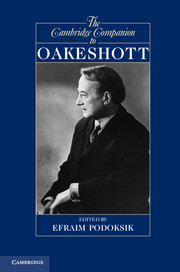Book contents
- Frontmatter
- Introduction
- Part I Oakeshott's philosophy
- Part II Oakeshott on morality, society and politics
- Part III Oakeshott and others
- 11 Oakeshott in the context of British Idealism
- 12 Oakeshott in the context of German Idealism
- 13 Oakeshott's contribution to Hobbes scholarship
- 14 Oakeshott and the Cold War critique of political rationalism
- Bibliography
- Index
13 - Oakeshott's contribution to Hobbes scholarship
from Part III - Oakeshott and others
Published online by Cambridge University Press: 28 September 2012
- Frontmatter
- Introduction
- Part I Oakeshott's philosophy
- Part II Oakeshott on morality, society and politics
- Part III Oakeshott and others
- 11 Oakeshott in the context of British Idealism
- 12 Oakeshott in the context of German Idealism
- 13 Oakeshott's contribution to Hobbes scholarship
- 14 Oakeshott and the Cold War critique of political rationalism
- Bibliography
- Index
Summary
INTRODUCTION
The figure of Thomas Hobbes held a special fascination for Michael Oakeshott. Over a period of about four decades from the 1930s to the 1970s Oakeshott wrote a series of essays and reviews on Hobbes that remains an important touchstone in the world of Hobbes scholarship. At first glance it might appear odd that Oakeshott the philosophical idealist and critic of rationalism would be attracted to a philosopher such as Hobbes, whose place in the formation of modern rationalism and materialism is the stuff of legend. The fact that this materialist/rationalist reading of Hobbes, to the extent that it is still maintained, is so only in a qualified form, is in no small part due to the work of Oakeshott and a few others, such as Leo Strauss, A. E. Taylor and Howard Warrender, who, in the middle years of the twentieth century overturned many of the traditional assumptions about Hobbes and set the modern Hobbes industry on its course.
One of the central features of this literature was the endeavour to uncover the unity that was believed to lie at the heart of Hobbes's thought. For all of their differences, Strauss, Warrender and Oakeshott offered readings of Hobbes that sought to bring together the disparate parts into a unified vision. For Oakeshott, this could be found by identifying the ‘single passionate thought’ which, like Ariadne's thread, ties the various parts together.
- Type
- Chapter
- Information
- The Cambridge Companion to Oakeshott , pp. 296 - 318Publisher: Cambridge University PressPrint publication year: 2012
- 3
- Cited by



